Key takeaways:
- Dyslexia affects not only reading skills but also self-esteem and emotional health, leading to feelings of isolation and frustration.
- Training for educators and peers fosters empathy and equips individuals with strategies to support dyslexic individuals effectively.
- Adopting a multisensory approach and incorporating technology in dyslexia training significantly enhances learning experiences.
- Dyslexia blogs highlight the importance of finding one’s voice and building a supportive community to share experiences and coping strategies.
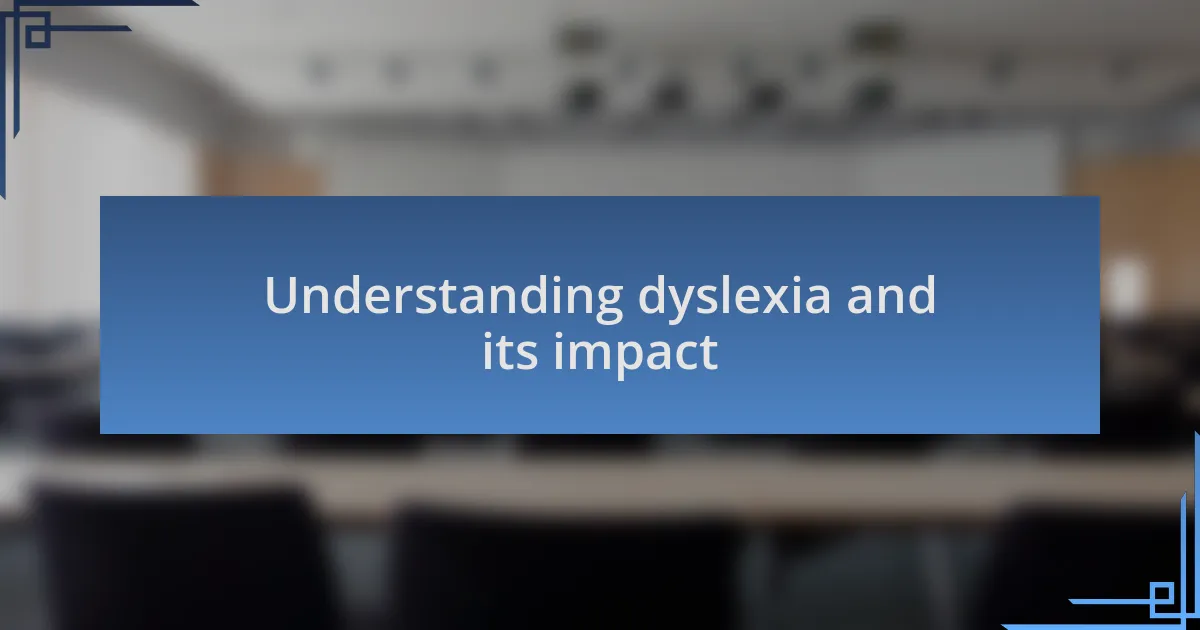
Understanding dyslexia and its impact
Dyslexia is more than just difficulty in reading; it can affect a person’s self-esteem and overall emotional health. I remember a client sharing how, despite her intelligence, she felt continuously overwhelmed and frustrated by the expectations placed upon her. Have you ever been in a situation where you felt everyone was moving forward while you were standing still? That’s often how individuals with dyslexia feel in academic and professional environments.
The impact of dyslexia extends beyond the classroom, seeping into social interactions and personal confidence. During one workshop, a participant candidly spoke about how not being able to articulate his thoughts as quickly as others left him feeling isolated. How many bright ideas go unheard simply because the words don’t come easily? These moments of silence can shape not just learning experiences but also long-lasting relationships.
Furthermore, the ways dyslexia manifests—whether through persistent spelling errors or difficulty with word retrieval—can create an ongoing narrative of struggle. I vividly recall a time when a student revealed that the anxiety she felt during reading aloud in class made her dread school itself. It makes me wonder: how can we shift the narrative from seeing dyslexia as a limitation to recognizing it as a different way of processing information? Understanding this deeper emotional impact is crucial for creating supportive environments where those with dyslexia can thrive.
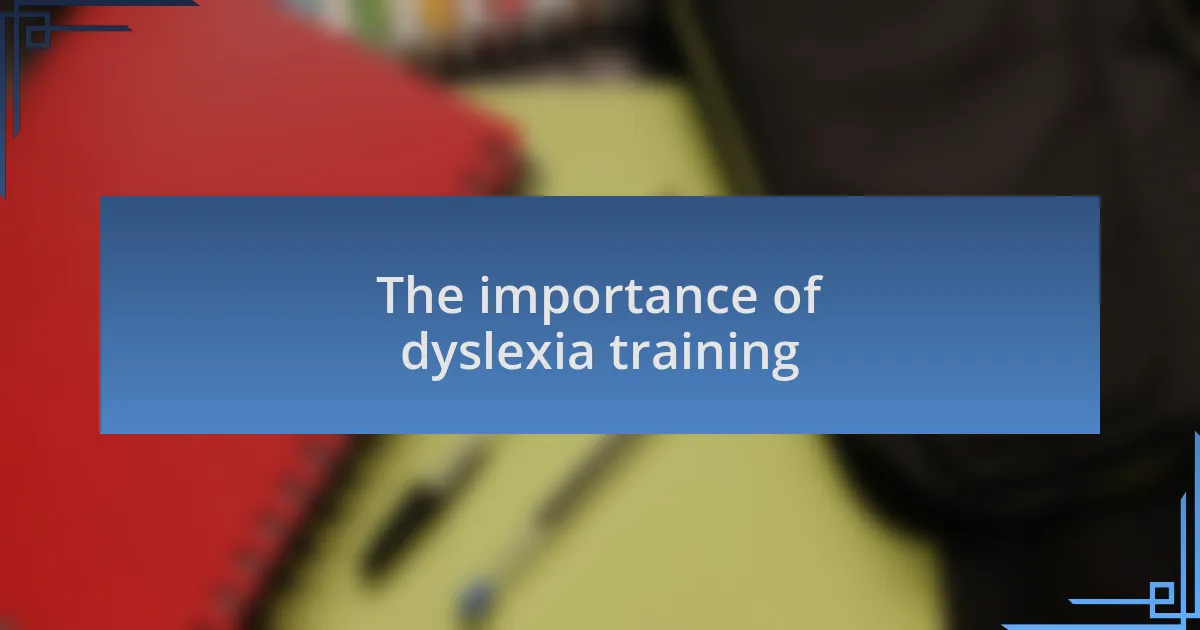
The importance of dyslexia training
Training around dyslexia is essential, not just for individuals who have it, but also for educators and peers alike. I remember leading a training session where a teacher shared how much more effective her classroom became after learning specific strategies to support dyslexic students. It’s enlightening to realize that with the right tools, educators can transform their teaching methods, making a significant difference in students’ learning experiences.
Having undergone various dyslexia training programs myself, I can attest to the profound shift in perspective they provide. Often, the knowledge is not just about teaching techniques; it’s also about fostering empathy and understanding. I recall a moment when I realized that by simply taking the time to understand a student’s struggles, I not only helped her but enriched the entire class’s camaraderie. Isn’t it intriguing how awareness can bridge gaps and create a supportive community?
Moreover, dyslexia training empowers individuals to advocate for themselves. I once met someone who, after participating in a workshop, felt confident enough to explain her needs to her employer. This sense of agency can change lives, not just academically but professionally and personally. When we equip ourselves with knowledge, we create a ripple effect of understanding and support that can influence future generations. Isn’t that something worth striving for?
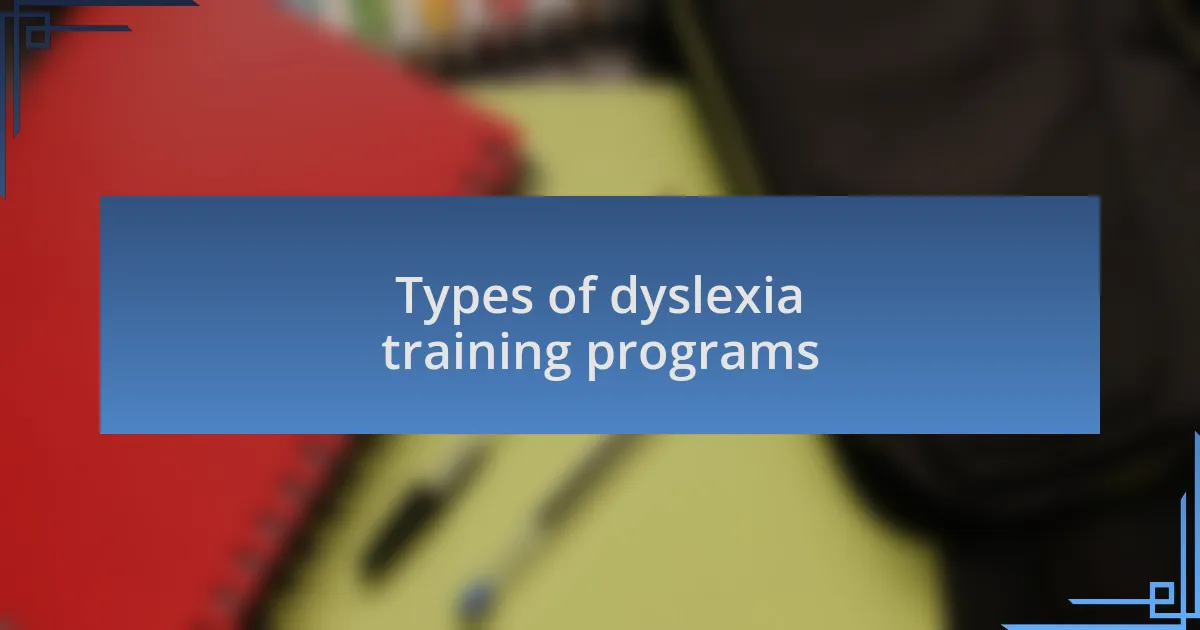
Types of dyslexia training programs
Understanding the various types of dyslexia training programs can significantly impact how we approach learning and teaching. For instance, I’ve seen firsthand how structured literacy programs focus on phonics and decoding skills. These programs often break down language into manageable parts, making it easier for individuals to grasp complex concepts. Doesn’t it feel empowering when learning becomes more streamlined?
In addition to structured literacy, there are programs aimed at developing self-advocacy skills. I remember attending a workshop where participants practiced articulating their needs in educational settings. Witnessing individuals gain confidence in expressing their challenges was truly inspiring. How important is it for someone to voice their struggles in a supportive environment, especially when that leads to better accommodations and understanding?
Lastly, online training modules are increasingly popular and can be tailored to fit diverse learning styles. I once explored an interactive online course that allowed users to engage with simulations of dyslexia. This approach not only broadened my understanding but also deepened my empathy for those facing these challenges daily. Can you imagine how impactful it is when educators and peers can truly walk in someone else’s shoes?
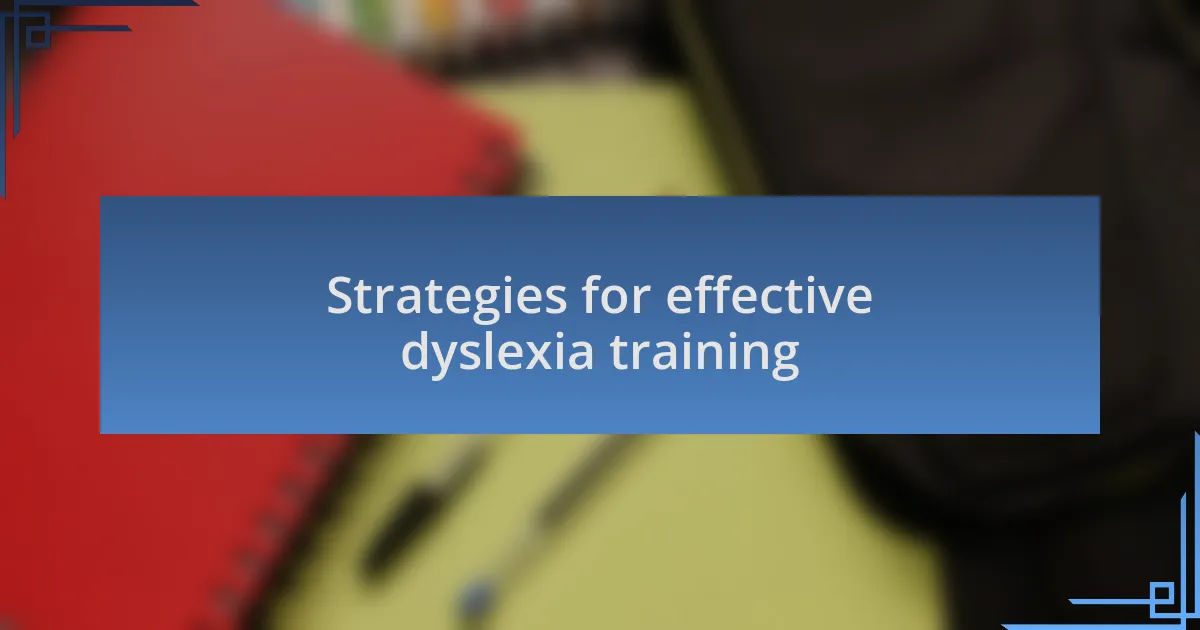
Strategies for effective dyslexia training
Adopting a multisensory approach can dramatically enhance dyslexia training. I remember a workshop where we used colored overlays and manipulatives to teach sounds. That experience opened my eyes to how engaging multiple senses can create a more immersive learning environment. Have you ever tried learning something new through touch or sight? It really adds a layer of understanding.
Incorporating technology in training is another effective strategy. I once came across an app designed for individuals with dyslexia that uses interactive exercises to reinforce reading skills. It was incredible to see participants’ excitement as they progressed at their own pace. How much more invested do we become when we can track our improvements through fun and engaging tools?
Regular feedback is crucial as well. I can’t stress enough how valuable it was during my training sessions when instructors provided constructive criticism. It not only helped me refine my techniques but also boosted my confidence. Why is it that feedback often makes us feel supported, rather than criticized? In my experience, it fosters a sense of trust that encourages growth.
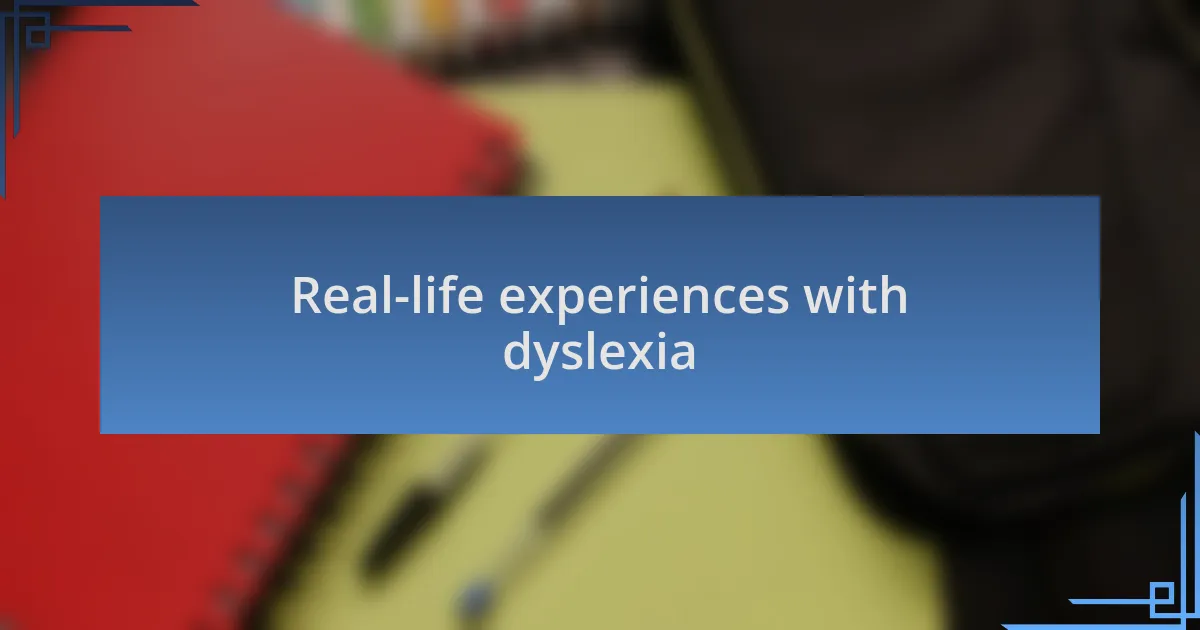
Real-life experiences with dyslexia
In my own journey with dyslexia, I’ve often encountered moments of frustration that felt overwhelming. I remember sitting in class, staring at the words that seemed to dance off the page. It was disheartening, but eventually, I discovered that these challenges also sparked a profound drive within me to learn differently. Have you ever felt the urge to conquer something that seemed insurmountable? For me, that was the motivation to find my own path in understanding literature.
I’ve had the privilege of meeting others who share similar experiences with dyslexia, and their stories resonate deeply. One friend described how reading aloud in front of a group made her stomach churn. She felt vulnerable, yet she also discovered a sense of community and support among those who understood her struggles. Isn’t it amazing how sharing our experiences can create connections that help us heal?
Reflecting on my own experiences, I realize that success often came from a mix of perseverance and creativity. There were days when simply decoding sentences felt like climbing a mountain. But on those tougher days, I turned to art and storytelling, finding ways to express my thoughts beyond words. This reminded me that everyone has their unique strengths. Have you found your own creative outlets? For me, they became invaluable tools in navigating my dyslexia journey.
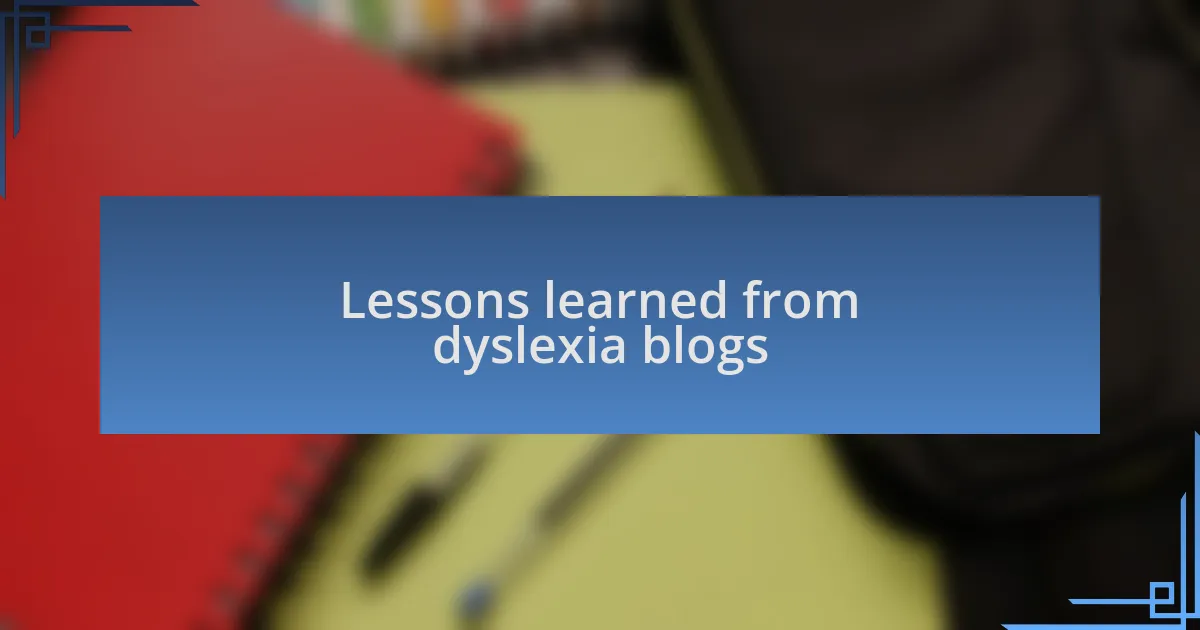
Lessons learned from dyslexia blogs
Dyslexia blogs have been an incredible source of insight and inspiration for me. I often found myself nodding along as writers shared their stories, like the time one blogger recounted an early experience with a teacher who patiently helped him sound out words. It struck a chord because it reminded me of my own teachers who fought to understand my challenges. Isn’t it uplifting to know that kindness can make such a pivotal difference in someone’s life?
One poignant lesson I gleaned from these blogs is the importance of finding one’s voice. A fellow dyslexic writer shared how keeping a journal transformed her fear of writing into a journey of self-discovery. I’ve experienced something similar; writing my thoughts down helped me unravel the complexities of my feelings. Have you tried expressing your emotions on paper? It’s such a liberating practice that can truly reshape the way we perceive our struggles.
Furthermore, dyslexia blogs often emphasize the value of community. After reading about a group of dyslexic adults who meet to compare notes and share coping strategies, I realized how vital it is to surround ourselves with supportive people. In my own experience, connecting with others who understand our unique challenges can offer a profound sense of relief. Isn’t there comfort in knowing we’re not alone in this journey? Through these shared stories, I’ve learned that embracing our differences can forge powerful bonds.